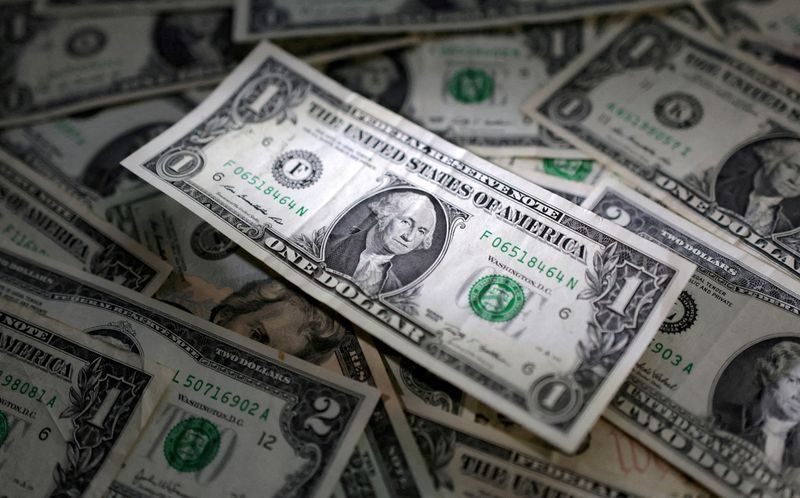By Marc Jones
LONDON (Reuters) -Signs of de-dollarisation are unfolding in the global economy, strategists at the biggest U.S. bank JPMorgan (NYSE:JPM) said on Monday, although the currency should maintain its long-held dominance for the foreseeable future.
The strains of steep U.S. interest rate rises and sanctions that have frozen Russia out of the global banking system have seen a fresh push by the "BRICS" nations, Brazil, Russia, India, China and South Africa, to challenge the dollar's hegemony.
JPMorgan strategists Meera Chandan and Octavia Popescu said that while overall dollar usage is within its historical range and the greenback remains at the top of the pack, a closer look shows a more bifurcated picture.
Their assessment on the dollar is the most high profile by any large U.S. bank so far, although heavyweight money managers such as Goldman Sachs (NYSE:GS) Asset Management have aired similar views.
While the greenback's share of FX trading volumes remains just shy of record highs at 88% and its use in trade invoicing has not changed much over the last couple of decades, other areas have seen an erosion.
In the FX reserves held by central banks around the world, for example, its share has declined to a record low of 58%.
Although that is still by far the largest share of any global currency, it drops further when accounting for gold, which now comprises 15% of reserves versus 11% five years ago.
"Some signs of de-dollarization are emerging," JPMorgan's analysts said, adding the trend was likely to persist even as the dollar maintains its "large footprint".
Efforts by BRICS countries and other major commodity exporters to loosen the dollar's stranglehold on global commerce have ramped up since the start of the war in Ukraine, which saw the U.S. freeze a large chunk of Russia's foreign reserves.
Since then Saudi Arabia and China have begun talks to settle Chinese oil sales with the yuan, Brazil and China have announced the phase-in of a yuan clearing arrangement for some trade between the two countries while China and Russia are also now doing a significant portion of their trade in yuan.
China's yuan now accounts for a record but still small 7% of FX trading volume, while the euro's slice has shrunk 8 percentage points over the last decade of ultra low interest rates to 31%.
Trade invoicing has not seen much change, with the dollar and euro maintaining a steady 40-50% share over recent decades, although the U.S. share of global exports is now estimated at a record low 9% compared to record high 13% for China.

Progress in internationalising the yuan has been limited, meanwhile, JPMorgan added, and is unlikely to change much given the country's capital controls.
The "CNY" is 2.3% of SWIFT payments, JPMorgan's analysts said, versus 43% for the dollar and 32% for the euro.